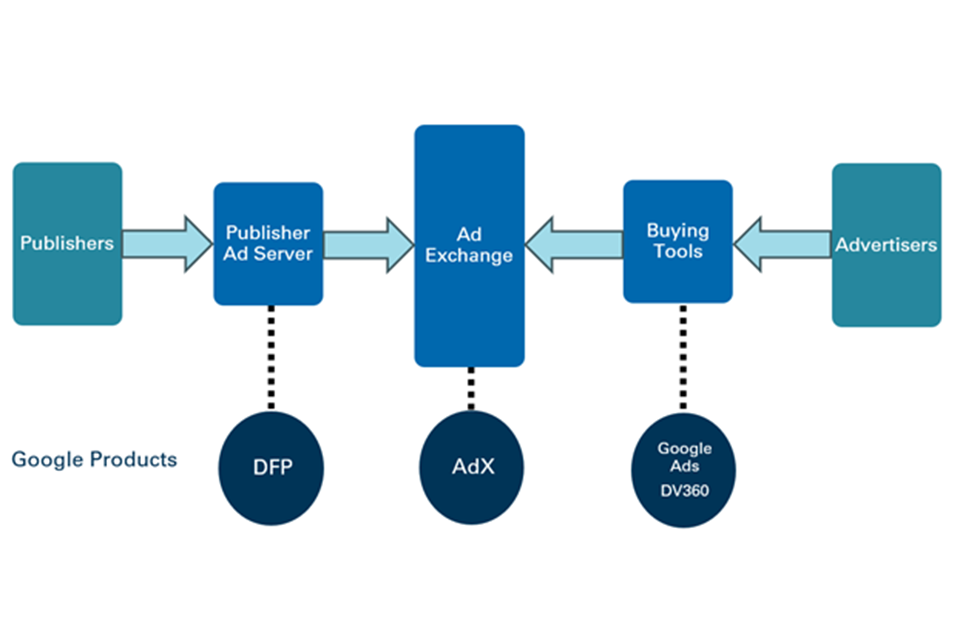CMA objects to Google’s ad tech practices in bid to help UK advertisers and publishers
Statement of objections sets out how Google may have broken competition law by using its dominance to favour its own ad tech services in open-display advertising.

iStock
- The CMA provisionally finds that Google has abused its dominant positions through the operation of both its publisher ad server and buying tools to restrict competition in the UK
- The provisional findings relate to how Google ‘self-preferences’ its own ad exchange - harming competition and, as a result, advertisers and publishers
- Action in the UK comes alongside US and EU agencies which are also investigating similar concerns
An investigation by the Competition and Markets Authority (CMA) has provisionally found that Google is using anti-competitive practices in open-display ad tech, which it believes could be harming thousands of UK publishers and advertisers.
As set out in a statement of objections issued to Google today (Friday 6 September), the CMA has provisionally found that, when placing digital ads on websites, the vast majority of publishers and advertisers use Google’s ad tech services in order to bid for and sell advertising space.
The CMA is concerned that Google is actively using its dominance in this sector to preference its own services. Google disadvantages competitors and prevents them competing on a level playing field to provide publishers and advertisers with a better, more competitive service that supports growth in their business.
In its 2019 market study into digital advertising, the CMA found that advertisers were spending around £1.8 billion annually on open-display ads, marketing goods and services via apps and websites to UK consumers.
Juliette Enser, Interim Executive Director of Enforcement, said:
We’ve provisionally found that Google is using its market power to hinder competition when it comes to the ads people see on websites.
Many businesses are able to keep their digital content free or cheaper by using online advertising to generate revenue. Adverts on these websites and apps reach millions of people across the UK – assisting the buying and selling of goods and services.
That’s why it’s so important that publishers and advertisers – who enable this free content – can benefit from effective competition and get a fair deal when buying or selling digital advertising space.
The US Department of Justice and European Commission have also opened separate investigations into Google’s activities in ad tech. These proceedings are currently ongoing.
About the open display ‘ad tech stack’ and the CMA’s concerns
The digital advertising technology sector, commonly referred to as the ‘ad tech stack’, consists of various intermediaries that facilitate the sale of online open-display advertising space on websites or mobile apps between ‘sellers’ (i.e. publishers) and ‘buyers’ (i.e. advertisers).
When a user opens a website or app, while the content loads on the page, a near-instantaneous series of auctions and transactions takes place to determine which ads will be shown to that user on that webpage or app. This process involves sending requests for bids and, in response, advertiser bids being sent through a chain of various intermediaries to match the space on the webpage with the advertiser willing to pay the most for it.
The CMA’s investigation has focused on Google’s role as an intermediary in three key parts of this chain, where it has a powerful market position with high market shares. For advertisers, Google operates two ad buying tools, known as “Google Ads” and “DV360”. For publishers, it operates a publisher ad server, known as “DoubleClick For Publishers” (DFP). In the centre of the ad tech stack, Google operates an ad exchange, known as “AdX”. Ad exchanges typically receive requests for bids from publishers and responding bids from advertisers, and then conduct an auction to match these two sides. AdX is where Google charges its highest fees in the ad tech stack (approximately 20% of the bid amount).

Simplified overview of the ad tech stack, key intermediaries and Google's ad tech products
The CMA’s provisional findings relate to anti-competitive ‘self-preferencing’ by Google. The CMA has provisionally found that, since at least 2015, Google has abused its dominant positions through the operation of both its buying tools and publisher ad server in order to strengthen AdX’s market position and to protect AdX from competition from other exchanges. Moreover, due to the highly integrated nature of Google’s ad tech business, the CMA has provisionally found that Google’s conduct has also prevented rival publisher ad servers from being able to compete effectively with DFP, harming competition in this market.
Google has done this through various practices that give AdX competitive advantages, disadvantage Google’s rivals, and are against the interests of Google’s advertiser and publisher customers. These practices have evolved over time and include:
- providing AdX with exclusive or preferential access to advertisers that use Google Ads’ platform;
- manipulating advertiser bids so that they have a higher value when submitted into AdX’s auction than when submitted into rival exchanges’ auctions; and
- allowing AdX to bid first in auctions run by DFP for online advertising space, effectively giving it an ‘right of first refusal’ - with rivals potentially not having any chance to submit bids.
The CMA has provisionally found that this anti-competitive conduct is ongoing. The CMA is therefore considering what may be required to ensure that Google ceases the anti-competitive practices, and that Google does not engage in similar practices in the future.
The CMA will now carefully consider representations from Google before reaching its final decision. For more information, visit the CMA’s investigation into suspected anti-competitive conduct by Google in ad tech case page.
Notes to editors:
- The ad tech industry provides a number of digital tools which form the ‘ad tech stack’, including the following:
- publisher ad servers - used by publishers to manage the advertising space on their websites and apps;
- ad buying tools - used by advertisers and media agencies to buy display ads; and
- ad exchanges (also known as ‘supply-side platforms’) - where publishers and advertisers meet in real time, typically via auctions, to buy and sell display ads.
- Online display advertising inventory is primarily sold programmatically (ie through automated systems and processes), but a minority is also sold via direct deals between publishers and advertisers (which involve more limited use of the ad tech stack). The CMA’s provisional findings relate to programmatic transactions.
-
The competition legislation relevant to the CMA’s investigation is the Competition Act 1998. This case concerns the Chapter II prohibition, which prohibits the abuse of a dominant position which may affect trade within the UK.
-
A statement of objections gives the addressee (in this case, Google) notice of a proposed infringement decision under the competition law prohibitions in the Competition Act 1998. The addressee has the opportunity to make representations on the matters set out in the statement of objections. Any such representations will be considered by the CMA before any final decision is made. The final decision is taken by a 3-member case decision group, which is separate from the case investigation team and was not involved in the decision to issue the statement of objections.
- The CMA may impose a financial penalty on any business found to have infringed the Chapter II prohibition of up to 10% of its annual worldwide group turnover. In calculating financial penalties, the CMA takes into account a number of factors including seriousness of the infringement(s), turnover in the relevant market and any mitigating and/or aggravating factors. The CMA may also issue legally binding directions to bring an infringement to an end.
-
“Google” refers to Google UK Limited, Google Ireland Limited, Google LLC and Alphabet Inc.
- For media enquiries contact the CMA press office on 0203 738 6460 or press@cma.gov.uk.